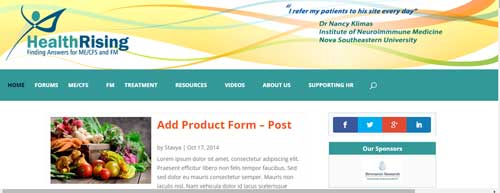Sometimes things all seem to happen at once. This is one of those times. There’s lots going on this month.
Webinars, TV Shows, Conference Calls and Summits
Alan Light On “New Developments in ME/CFS”
Alan Light graphs showing almost off the chart changes in gene expression in ME/CFS patients is perhaps the most vivid visual portrayal of post-exertional malaise yet produced. One of the few ME/CFS/FM researchers to consistently get NIH grants, Alan Light has produced 9 papers, mostly on the effects of exercise on the gene activity in ME/CFS, FM, depression, prostate cancer, depression and multiple sclerosis. He’s on the cutting edge of understanding how PEM occurs.
Carol Head doing an impromptu interview with Dr. Light
Now he’s talking on “New Developments in ME/CFS”: this is a webinar that is probably not to be missed.
PBS Airing TV Show On ME/CFS
The “Second Opinion” TV show will feature ME/CFS on PBS stations around the country Oct. 12. The show features Danielle Warner, sister of SMCI board member Aaron Paas, and her husband, Tyrone. The show also will be posted online at http://secondopinion-tv.org/ on that date.
The CDC’s POCA Conference Call
The CDC does a conference with a researcher or doctor twice a year. In this call Dr. Unger will first go over what’s happening with the CDC’s ME/CFS program and then she’ll turn the mic over to Dr. Lapp (Hunter-Hopkins Center) and Bruce Campbell (CFIDS Self-help). They will talk on something most of us know we could be doing better at – and would feel better because of it – pacing. Bruce Campbell is the poster child for pacing; he basically paced himself out of ME/CFS.
The free one-hour conference call is on *Thursday, October 8*. It will begin at 1 pm Pacific time / 4 pm Eastern. To join the call, dial *800-593-9959* and key in the conference code *8266520.* For more details, see: http://www.cdc.gov/cfs/meetings/cfspcoca.html
The Mindfulness Summit
If you’re feeling down, angry or frustrated the Mindfulness Summit might be for you. If you’re interested in using mindfulness or meditative techniques to improve your quality of life, and ease of mind, or even improve your health a bit, it’s definitely for you.
Some of the many speakers are:
- Tara Brach – the author of Radical Acceptance – a good idea for anyone with a chronic illness will be speaking. She had chronic fatigue syndrome/IBS for years and later was found to have an autoimmune disorder. She knows how helpful”Radical Acceptance” can be for those with chronic illnesses.
- John Kabat Zinn created the Mindfulness Based Stress Reduction (MBSR) program used across the U.S. to alleviate chronic pain. The program was produced for people in pain who could not tolerate pain drugs.
- Jack Kornfield – If you know of Buddhism you probably know of Jack Kornfield – a seminal figure in U.S. Buddhism for the past twenty or so years.
- Arianna Huffington has given mindfulness a central place in the Huffington Report.
Register for the (almost) month-long summit and get access to all the presentations for free here. Health Rising is an affiliate of the Mindfulness Summit
Surveys
Lenny Jason’s Big Symptom Study

If ME/CFS is a real disease then it should be different from MS, lupus and cancer. Lenny Jason aims to show how
Lenny Jason is doing just what the critics said the ME/CFS field needs to be doing to legitimize itself and hasn’t been doing: comparing ME/CFS to other diseases. Jason wants to know how the fatigue and other symptoms found in ME/CFS differ from those found in MS, lupus and cancer. (He’s good at this. If you remember Jason earlier showed that ME/CFS can be differentiated from depression simply by assessing symptoms.) In this massive survey – it takes about 45 minutes (but you can pause it whenever you want) – Jason and his DePaul Team ask just about every question you can ask about symptoms.
To participate in the study you should be
- Adults at least 18 years of age
- able to read or speak English
- Have a diagnosis of Multiple Sclerosis, Lupus Erythematosus, Cancer, Myalgic Encephalomyelitis, or Chronic Fatigue Syndrome.
Prohealth Diet Survey
May people with ME/CFS and FM turn to special diets. ProHealth would like to know what dietary changes you’ve made or supplements you’ve tried for gut problems and if they’ve been helpful for not. Please take their survey HERE.
Dr. Baraniuk’s Emergency Room Survey
Has ME/CFS ever driven you to the emergency room? If it has Dr. Baraniuk would like to know how it went. Take his ME/CFS Emergency Room Survey here.
Health Rising in October
It’s going to be a busy October for HR. Over the next couple of weeks four things will happen:
Our new website will (finally) be up:
We will introduce two new programs:
- A Lives Interrupted program – designed to demonstrate the kind of people ME/CFS affects and the seriousness and costs of the disease. The program will focus on contrasting what you were doing before and after you got ME/CFS.
- ME/CFS/FM Experts Q&A program – in this program you can ask ME/CFS/FM experts questions about health, disability and coping
and we will revive
- The ME/CFS/FM Doctors Panel program – where ME/CFS/FM experts take on one case a month and give their treatment recommendations








Just wondering if Allen Light’s webinar will be recorded &/or transcribed for those of us who won’t be able to listen?
Unless something goes wrong – it did only once that I can remember – they are all post to Youtube I believe
so much happening – it gives me hope 🙂
i’ve done two of the surveys. i’m always perplexed by some questions about energy levels and severe fatigue. should we rate ourselves compared to ‘normal healthy people’ or ‘our personal normal’ ? and because resting / activity can have such a severe impact, should we rate ourselves as if we’ve been attempting ‘normal healthy people activities’, or have been resting 24/7 for a few weeks ?
if we’ve been doing Extreme Resting, we might have minimal fatigue and some energy, compared to our normal. this might be confused with ‘healthy’.
If we’ve recently attempted a tiny bit of activity, we might have extreme fatigue and extremely low energy, compared to our normal.
maybe future surveys should attempt to capture these differences ?
Great question. I imagine that we should state our fatigue levels in general over that last couple of weeks or month – knowing that the survey could misinterpret that. It does ask about post exertional problems so it should capture whether activity is associated with fatigue.
I think it did ask about activity levels – so you could have someone with low activity levels, low fatigue and nigh PEM (a person who is pacing well) or someone with moderate activities, moderate fatigue and high PEM (some who is not pacing as well) and someone with moderate activity levels, high fatigue and other symptoms and high PEM (someone who’s pacing leaves a lot to be desired.) 🙂
If this comes to fruition, I imagine it will help doctors a lot when treating ME/CFS patients: http://www.popsci.com/this-test-can-detect-any-virus-that-infects-humans
So, Dr. Alan Light around 2:40 starts talking about the FATIGUE SYSTEM and the components being Cardiovascular, Gastronomic, Brain and Autonomic.
So that is why I have Hypotension and fainted during a Table Tilt test around age 32? Still no causation but over and over it is stated that most had a severe virus (a small number like myself had mono and I happen to have had Fibro 5 years prior to mono and going into ME/CFS), bacterial infection, toxic mold exposure, chemical exposure or Multiple Chemical Sensitivities that suddenly spiraled out of control and they went into ME/CFS. A good number have the dual diagnosis of ME/CFS and Fibro like I do but they are separate diagnosis. It is also often stated that they believe there is a genetic component and eventually “something” would have come along to send us into ME/CFS as they see it running in families. Many that have the ME/CFS diagnosis have the co-morbid POTS (I do not) and can be the most severe cases making them the “Severely Ill” ending up in a wheelchair or bed bound although they do not have to have POTS to make them the 25% Severely Ill. (And I am stating all this information only on my own reading of articles, research, patient discussions, etc.)
Causation will probably determine treatments as there seem to be subsets that have different health issues.
Thanks for the summary Cort. I do always miss the conference calls and Webinars as I always forget but I know they always end up on youtube.
The Prof Jason questionnaire has actually got questions about muscle weakness. That’s a start. Might just ignore the fatigue part now 🙂
And muscle fatigue after mild physical exertion. Unfortunately, I’m guessing that most people will fill in the fatigue bit and lots of symptoms and it will be interpreted as too many symptoms, hence fulfil the criteria for psychosomatic disorder. If only we could just focus on the more clearly defined symptoms and not add too many, just the core, severely disabling ones, it might help.